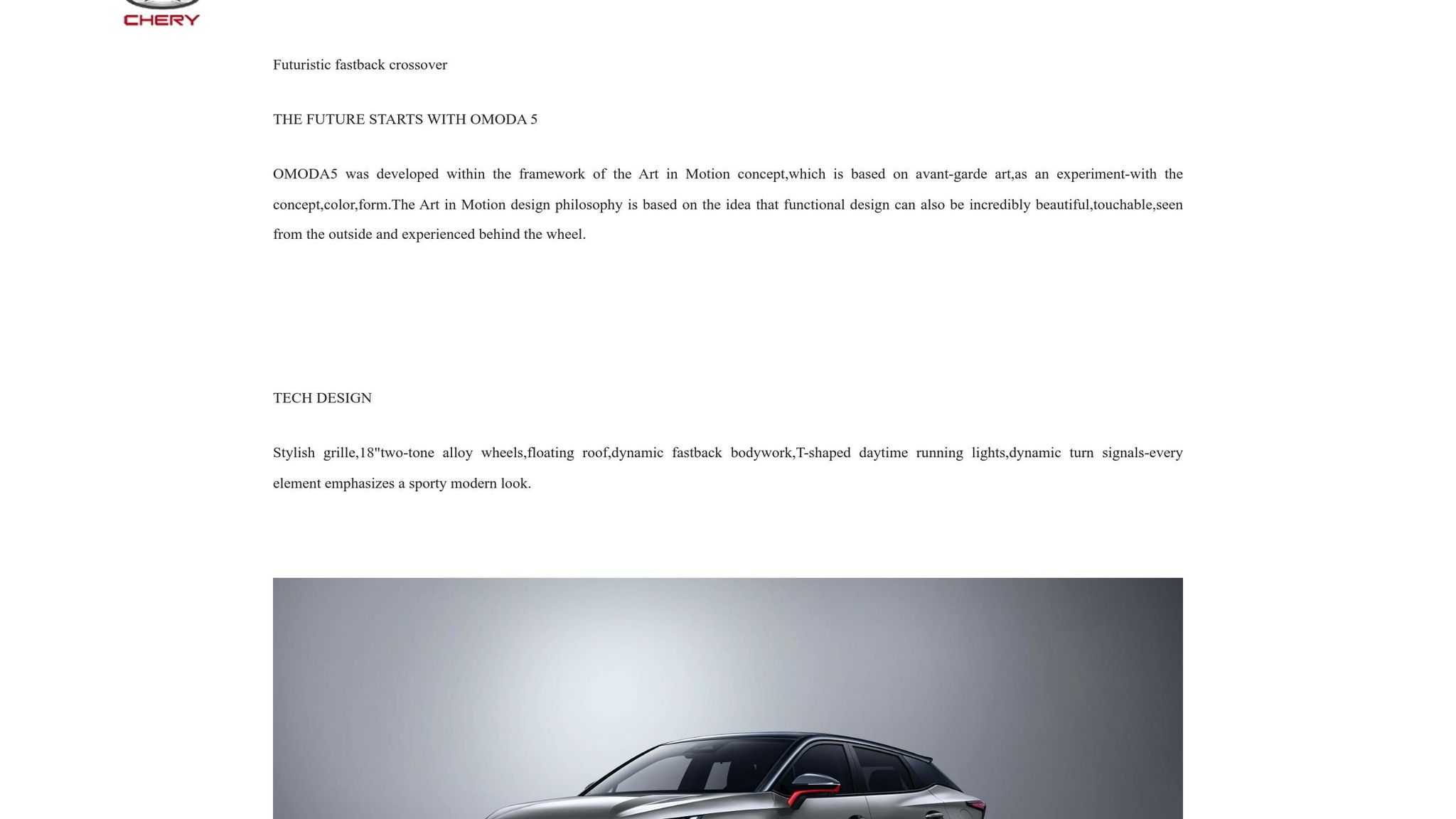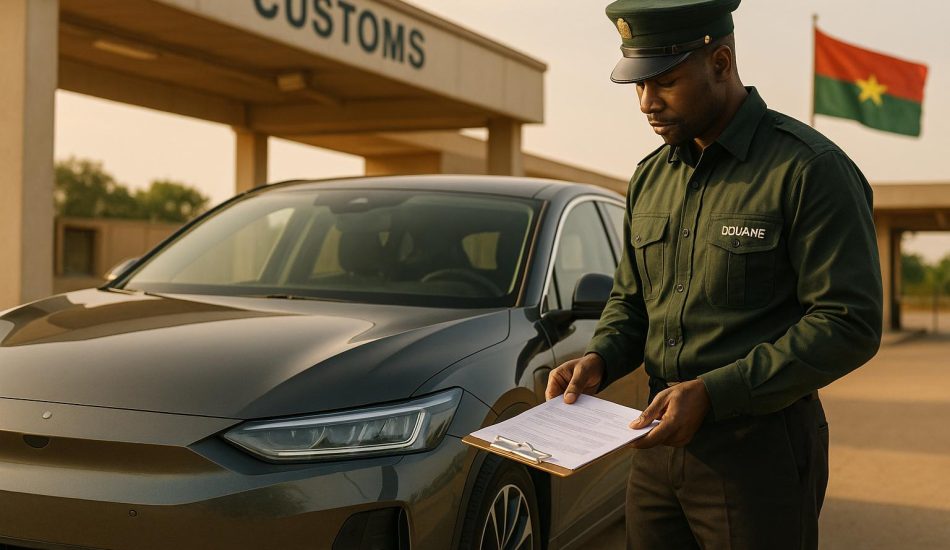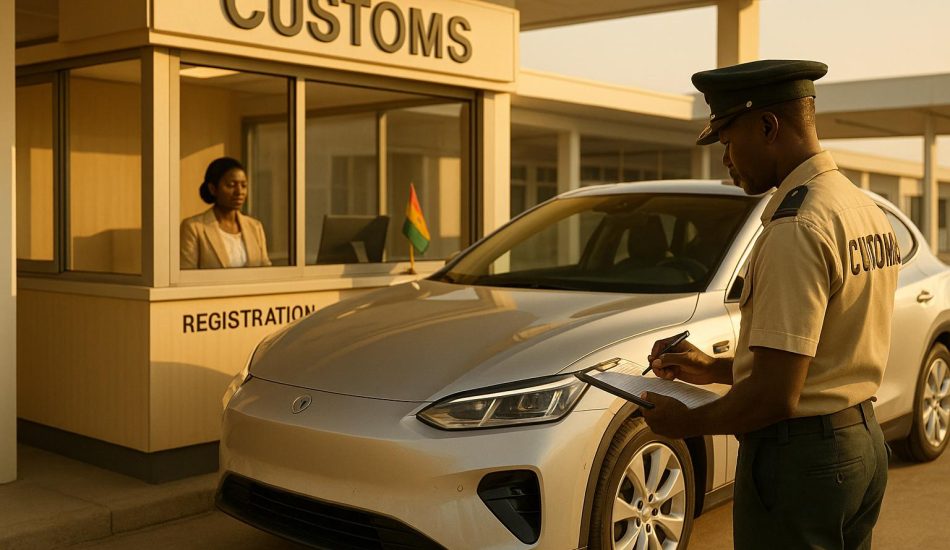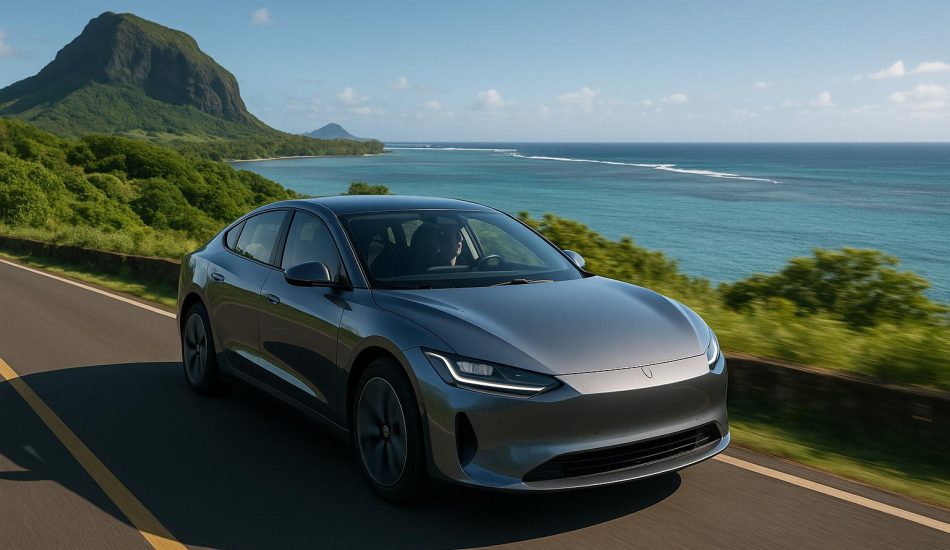
Chinese automaker Chery has introduced two hybrid SUVs – Omoda C9 and Jaecoo J7 – to South Africa, aiming to provide cost-effective and fuel-efficient options for consumers. With rising fuel prices and increasing demand for cleaner vehicle options, these hybrids are designed to meet local needs while addressing infrastructure challenges.
Key Highlights:
- Omoda C9: A premium plug-in hybrid SUV priced at $56,275 (999,000 ZAR), featuring a 150 km electric range, 440 kW power, and luxury features like Nappa leather seats and dual 12.3-inch displays.
- Jaecoo J7: A budget-friendly plug-in hybrid priced at $38,827 (689,900 ZAR), offering a 90 km electric range, 255 kW total output, and practical features like a 14.8-inch touchscreen and 1,200+ km combined range.
- Both models address South Africa’s limited EV infrastructure by combining electric and petrol power for maximum range and flexibility.
Quick Comparison:
| Feature | Omoda C9 PHEV | Jaecoo J7 SHS |
|---|---|---|
| Price | $56,275 (999,000 ZAR) | $38,827 (689,900 ZAR) |
| Electric Range | 150 km | 90 km |
| Combined Range | 1,100 km | 1,200+ km |
| Power Output | 440 kW | 255 kW |
| Cargo Space | 660 L | 410 L |
| Fuel Consumption | 1.4 L/100 km | 4.88 L/100 km |
Chery’s hybrids aim to balance performance, affordability, and practicality, making them well-suited for South Africa’s growing interest in cleaner transportation options.
The New Chery Super Hybrid

Omoda C9 Plug-in Hybrid: Specs and Features

The Omoda C9 is Chery’s premium plug-in hybrid SUV, making its mark in South Africa as a standout choice for drivers seeking a mix of performance, efficiency, and luxury.
Engine and Performance
At the heart of the Omoda C9 PHEV is a smart hybrid system that combines a 1.5-liter 4-cylinder turbo-petrol engine with dual electric motors. Together, they deliver an impressive 440 kW and 915 Nm of torque, allowing the SUV to sprint from 0 to 62 mph (0–100 km/h) in just 4.9 seconds.
The vehicle’s 3-speed DHT (Dedicated Hybrid Transmission) ensures seamless power delivery between the petrol engine and electric motors, while the all-wheel-drive system provides excellent handling across South Africa’s diverse terrains.
Fuel efficiency is a highlight, with the C9 PHEV consuming just 1.4 L/100 km. It offers a 93-mile electric-only range and a combined range of over 1,100 km, thanks to its 70-liter fuel tank. A 34.5 kWh LFP (Lithium Iron Phosphate) battery powers the system, keeping CO2 emissions low at just 38 g/km and meeting Euro 6e emissions standards. This makes the Omoda C9 a smart choice for eco-conscious drivers.
Technology and Comfort Features
Step inside the Omoda C9, and you’ll find a cabin designed for both luxury and practicality. The interior is decked out with Black/Light Brown Nappa leather-trimmed seats. The front seats are electrically adjustable – six-way for the driver and four-way for the passenger – and come with heating and ventilation functions. Rear passengers aren’t left out, enjoying heated seats and adjustable backrests.
To ensure a quiet ride, the SUV features acoustic laminated glass that minimizes outside noise. A 12-speaker Sony sound system delivers crisp audio, while wireless Apple CarPlay and Android Auto make smartphone integration effortless.
The dashboard boasts dual 12.3-inch digital displays – one for the driver and one for the central control panel. An Intelligent Voice Command system, activated by saying "Hello, OMODA", allows hands-free control of various functions. A 50W wireless charging pad ensures your devices stay charged without the hassle of cables.
Convenience features include remote keyless start, push-button ignition, and a power-operated tailgate that opens to reveal a 660-liter cargo space. Fold the rear seats flat, and the storage expands to an impressive 1,783 liters. Safety and driving aids include Adaptive Cruise Control, Automatic Braking, and Blind-Spot Monitoring.
Shannon Gahagan, Brand and Marketing Manager for OMODA & JAECOO South Africa, described the C9 PHEV’s appeal:
"The C9 PHEV signals OMODA’s readiness to compete in the electrified premium SUV space, with a vehicle that delivers on what today’s drivers value most: electric capability, long-range usability, and luxury features that feel a class or two above",
Charging Options and Daily Use
The Omoda C9 PHEV is built for practicality as much as luxury. It supports 70 kW DC fast-charging, enabling the battery to charge from 30% to 80% in just 25 minutes at compatible public charging stations. For home use, the 34.5 kWh battery can be fully recharged in 5.5 hours using a dedicated wall box charger.
With a 150 km electric range, the C9 PHEV is perfect for daily urban commutes. When the battery runs low, the petrol engine seamlessly takes over, making it ideal for longer trips or areas with limited charging infrastructure.
The hybrid system intelligently switches between electric and petrol power to maximize efficiency, whether you’re navigating city traffic or cruising on the highway. Chery offers a 10-year/200,000 km warranty on the electric drivetrain, giving buyers added confidence. With a total range exceeding 1,100 km, the Omoda C9 PHEV is ready for everything from short commutes to cross-country adventures in South Africa.
Jaecoo J7 SHS Plug-in Hybrid: Specs and Features

The Jaecoo J7 SHS is Chery’s budget-friendly entry into South Africa’s plug-in hybrid market. At a price of $45,993 (R689,900), it ranks as the second most affordable PHEV in South Africa, just behind the BYD Sealion 6 Comfort.
Hybrid System and Performance
The J7 SHS combines a 1.5-liter four-cylinder turbo-petrol engine (105 kW, 215 Nm) with a 150 kW electric motor (310 Nm), resulting in a total output of 255 kW and 525 Nm. Its 18.3 kWh LFP battery provides an electric-only range of 90 km, with a total range of up to 1,200 km. During a recent endurance test from Cape Town to Gqeberha, the car achieved an impressive average fuel consumption of 4.88 L/100 km over 1,228 km in mixed driving conditions.
The hybrid system offers four driving modes: Full Electric for quiet city commutes, Series Hybrid for fuel efficiency, Parallel Hybrid for highway cruising, and Energy Recovery mode for regenerative braking. It runs on 95-octane premium unleaded fuel and keeps emissions as low as 31 g/km.
"The J7 SHS represents a significant step forward for the JAECOO brand in South Africa. It brings together performance, efficiency, and premium comfort in a way that meets the evolving needs of today’s drivers – whether they’re looking to reduce emissions, save on fuel, or simply enjoy the flexibility of an electrified drive."
Interior and Technology Features
Inside, the J7 SHS is designed to deliver both comfort and connectivity. The centerpiece of the cabin is a 14.8-inch LCD touchscreen, which supports wireless Apple CarPlay and Android Auto. Additional tech includes a 10.25-inch digital cluster, a head-up display, and an eight-speaker Sony sound system for high-quality audio. A 50W wireless charging bay ensures your devices stay powered without clutter.
Comfort features include heated and ventilated, electrically adjustable front seats, dual-zone climate control with rear air vents, and ambient lighting for a premium feel. The panoramic sunroof enhances the cabin’s open-air vibe. For cargo, the hybrid model offers 340 liters of boot space – slightly reduced from the 424 liters in front-wheel-drive models due to the battery placement. Safety is a priority, with a 360-degree surround-view camera, front and rear parking sensors, and over 15 driver assistance systems.
Practicality and Charging
The J7 SHS is built for everyday usability. Its 90 km electric range is ideal for urban commutes, while the petrol engine ensures longer trips are hassle-free. Charging options are versatile: a 40 kW DC fast charger can take the battery from 30% to 80% in just 20 minutes, and a 6.6 kW AC charger can fully charge it from 25% to 100% in 160 minutes. Drivers can choose from multiple modes – Eco, Normal, Sport, and EV – to match their driving needs, with EV mode being especially useful in areas with noise or emissions restrictions.
Weighing 1,794 kg and equipped with a single-speed hybrid transmission, the J7 SHS delivers stable handling across various road conditions. While some reviews noted slightly jerky pedal responses and room for improvement in steering feedback, the vehicle still offers a smooth ride, excellent fuel economy, and well-rounded performance. These qualities make it a solid choice for South Africans seeking efficient and versatile mobility.
sbb-itb-99e19e3
Omoda C9 vs Jaecoo J7: Side-by-Side Comparison
When deciding between the Omoda C9 and Jaecoo J7, it’s clear that Chery has designed these hybrids to meet different needs. The Omoda C9 leans toward high performance and premium features, while the Jaecoo J7 focuses on practicality and efficiency. Let’s break down how these two models stack up against each other.
Specs Comparison
Here’s a quick look at the key performance metrics for both models. The Omoda C9 PHEV stands out with its impressive 440 kW of power and 915 Nm of torque, going from 0 to 100 km/h in just 4.9 seconds. On the other hand, the Jaecoo J7 SHS delivers 525 Nm of torque, but its power output hasn’t been specified.
| Feature | Omoda C9 PHEV | Jaecoo J7 SHS |
|---|---|---|
| Power Output | 440 kW | Not specified |
| Torque | 915 Nm | 525 Nm |
| 0–100 km/h | 4.9 seconds | Not specified |
| Electric Range | 150 km | 90 km |
| Combined Range | 1,100 km | 1,200+ km |
| Fuel Consumption | 1.4 L/100 km (electric) / 6.9 L/100 km (hybrid) | 5.99 L/100 km (WLTP) |
| Cargo Space | 660 L | 410 L |
Fuel efficiency is another key difference. The Omoda C9 PHEV achieves 1.4 L/100 km when running on battery power, but this jumps to 6.9 L/100 km in hybrid mode. Meanwhile, the Jaecoo J7 SHS boasts a WLTP-rated 5.99 L/100 km, with real-world tests showing it can go as low as 3.5 L/100 km under optimal conditions.
Interior features also set these two apart. The Omoda C9 includes dual 12.3-inch screens, Nappa leather power-adjustable seats, and even integrated speakers in the driver’s headrest. The Jaecoo J7, however, offers larger touchscreen options – 13.2 inches or 14.8 inches depending on the trim – and adds heated and ventilated front seats, plus a cooling compartment in the central armrest.
Which Vehicle Fits Your Needs
For city dwellers, the Jaecoo J7 SHS is a practical choice. Its 90 km electric range is ideal for daily urban commutes, and its fuel consumption – tested at up to 1,427.5 km on a single tank and charge – makes it incredibly efficient. Under optimal conditions, it can achieve fuel consumption as low as 3.5 L/100 km.
If you’re after performance, the Omoda C9 PHEV is the clear winner. With 440 kW of power and a 0–100 km/h time of just 4.9 seconds, it offers sports car–level acceleration in an SUV package. Its 150 km electric range also provides more flexibility for emission-free driving, though it comes with a higher price tag.
For families, cargo space might be the deciding factor. The Omoda C9 offers a generous 660 L of storage, far outpacing the Jaecoo J7’s 410 L. This makes the Omoda C9 a better fit for road trips or daily errands that require more room.
In short, the Jaecoo J7 SHS is an excellent choice for those prioritizing fuel efficiency and practicality, while the Omoda C9 PHEV caters to drivers seeking high performance and premium features. Both models reflect South Africa’s growing interest in hybrid vehicles, offering 25–40% fuel savings compared to traditional cars.
How Chery’s Hybrids Affect South Africa’s Car Market
Chery’s latest hybrid vehicles are shaking up South Africa’s automotive scene. By combining electric and petrol power, these cars not only challenge the dominance of traditional gasoline engines but also offer a practical solution to reduce fuel costs and ease concerns about driving range.
The Rise of Hybrid Vehicles
The adoption of hybrid and electric vehicles in South Africa is gaining momentum. Sales of new energy vehicles more than doubled between 2023 and 2024, now making up 3% of total new car sales. While this percentage is still relatively small, it hints at a growing shift in consumer preferences. As Tony Liu, CEO of Chery South Africa, explained:
"Based on our experience in China, once the market share of new energy vehicles reaches almost 10%, then the demand will start to explode".
Hybrids are especially appealing in South Africa because they address range anxiety, a common concern for electric vehicle (EV) buyers, without requiring widespread charging infrastructure. They’re designed for long-range capability, which is crucial in a country where charging stations are limited and power outages are not uncommon. Hans Greyling, General Manager of Omoda & Jaecoo South Africa, highlighted this point:
"Battery electric vehicles have not really taken off in South Africa. We’ve gone the route of looking more towards traditional hybrids or plug-in hybrids".
This approach also aligns with the need to reduce emissions from road transport, which accounted for 45.74% of South Africa’s greenhouse gas emissions in 2019.
Chery’s Push for Cleaner Transportation
Chery is tackling South Africa’s environmental challenges head-on with its hybrid offerings. Between 2015 and 2019, emissions from road transport rose from 56.14 Mt CO2e to 59.49 Mt CO2e, underscoring the need for cleaner solutions. The introduction of models like the Omoda C9 and Jaecoo J7 provides an alternative that reduces reliance on fossil fuels without requiring consumers to change their refueling habits.
At the core of Chery’s strategy is its Super Hybrid technology. This system delivers high efficiency in both thermal and EV transmission, which is particularly important in South Africa, where coal remains a major part of the energy mix. By bridging the gap between traditional and electric vehicles, Chery’s hybrids offer a practical way to transition toward cleaner mobility while the country works to expand its renewable energy infrastructure.
Chery plans to launch eight hybrid models in South Africa, including five extended-range plug-in hybrids and three conventional hybrids. The pricing reflects local market needs, with the premium Omoda C9 priced at 999,000 rand ($56,275) and the more affordable Jaecoo J7 at 689,900 rand.
This combination of advanced technology and strategic pricing positions Chery as a key player in South Africa’s shift toward sustainable transportation.
Building Support for Hybrid and Electric Vehicles
For hybrids and EVs to thrive, a robust support system is essential. Platforms like EV24.africa are stepping in to make these vehicles more accessible across the continent. By offering detailed listings, transparent pricing, and flexible financing options, EV24.africa empowers buyers to make informed decisions.
What makes EV24.africa stand out is its ability to deliver vehicles to all 54 African countries, overcoming logistical challenges that often limit access to new automotive technologies. The platform also emphasizes affordability and customer feedback, addressing some of the main barriers to hybrid adoption. As Greg Cress from Accenture noted:
"As long as they remain affordable from an up-front cost perspective, they will be differentiated against legacy brands offering similar specifications".
With Chinese automakers like Chery providing advanced technology at competitive prices, platforms like EV24.africa are well-positioned to support South Africa’s growing interest in hybrids and EVs. Steve Chang, General Manager of BYD Auto South Africa, summed it up perfectly:
"I think South Africa and the rest of Africa have a very big opportunity to what I call leapfrog from ICE into renewable energy (cars)".
These combined efforts are paving the way for a cleaner, more sustainable future in transportation, not just in South Africa but across the entire continent.
Conclusion
Chery’s launch of the Omoda C9 and Jaecoo J7 hybrids marks a pivotal moment for South Africa’s automotive market. These plug-in hybrid SUVs combine cutting-edge technology, impressive performance, and practical solutions to rising fuel costs – all without the infrastructure challenges of fully electric vehicles. Here’s a closer look at how these models meet market demands and performance expectations.
The Omoda C9, with a price tag of $56,275, delivers luxury-level performance, boasting 440 kW of power and 915 Nm of torque. It’s positioned to compete directly with premium SUVs. On the other hand, the Jaecoo J7 SHS, priced at $38,850, offers incredible fuel efficiency at just 4.9 liters per 100 km, making it an appealing option for compact SUV buyers.
What sets these vehicles apart is their adaptability to South African conditions. The Omoda C9 features a 150 km electric-only range and an overall range of more than 1,100 km, while the Jaecoo J7 provides a 90 km electric range and a total range exceeding 1,200 km. Both models retain the reliability of traditional fuel, ensuring drivers can travel long distances without worrying about charging infrastructure.
Market data highlights the growing interest in hybrid vehicles. With 74% of South Africans now considering hybrids and plug-in hybrid sales nearly doubling in 2024, the timing of this launch seems ideal. As Shannon Gahagan of Omoda & Jaecoo South Africa stated:
"The C9 PHEV is a testament to our commitment to providing discerning drivers with more choice, combining the performance of a powerful SUV with the efficiency of electrification, all in a luxurious package".
Platforms like EV24.africa are also playing a vital role in making hybrid and electric vehicles more accessible across the continent, supporting the region’s shift toward cleaner mobility.
Chery’s hybrid lineup offers more than just new vehicle options – it provides a realistic pathway to cleaner transportation. These models allow drivers to reduce emissions without sacrificing performance, convenience, or range. As South Africa continues to expand its renewable energy infrastructure and charging networks, hybrids like the Omoda C9 and Jaecoo J7 offer an immediate solution for eco-conscious motorists.
The success of these vehicles could inspire other manufacturers to introduce similar technologies, further accelerating South Africa’s transition to sustainable transportation and solidifying its position as a leader in Africa’s clean mobility movement.
FAQs
What sets the Omoda C9 and Jaecoo J7 hybrids apart in terms of performance and features?
The Chery Omoda C9 hybrid is built for those who crave both power and luxury. It boasts a 257-horsepower inline 4-cylinder engine, 295 lb-ft of torque, and a 34.5 kWh battery. This setup, combined with an all-wheel-drive system and a 3-speed DHT automatic transmission, ensures a dynamic performance and a refined driving experience.
Meanwhile, the Jaecoo J7 hybrid focuses on efficiency and long-range capabilities. It delivers a combined output of 342 horsepower and 387 lb-ft of torque, thanks to its 1.5 TDGI DHT hybrid engine and an 18.3 kWh lithium-iron-phosphate battery. With a range of up to 745 miles on a full tank and charge, along with an electric-only range of around 56 miles, the J7 is perfect for extended journeys and eco-conscious driving.
The Omoda C9 shines with its emphasis on performance and luxury, while the Jaecoo J7 impresses with its efficiency, remarkable range, and advanced hybrid engineering.
How do Chery’s hybrid vehicles tackle South Africa’s limited EV charging infrastructure?
Chery’s hybrid vehicles tackle the hurdles of South Africa’s limited EV charging network head-on. With a lineup that includes both plug-in hybrids and standard hybrids, these cars are built to perform efficiently without being entirely dependent on public charging stations. This makes them an ideal option for regions where charging points are either scarce or unreliable.
These hybrids blend traditional fuel engines with electric motors, giving drivers the flexibility to switch between power sources as needed. Plus, they can be charged conveniently at home or at select public stations, which eases the reliance on a widespread charging network while paving the way for greener transportation solutions.
How could Chery’s new hybrid vehicles impact South Africa’s automotive market and consumer preferences?
The introduction of Chery’s hybrid vehicles, like the Omoda C9 and Jaecoo J7, is poised to shake up South Africa’s automotive scene. These models are tailored to meet the rising demand for fuel-efficient, environmentally friendly, and tech-savvy vehicles, reflecting the broader global trend toward greener transportation options.
With hybrids that boast affordable pricing, reduced emissions, and features suited for African roads, Chery has the potential to appeal to a diverse group of buyers. This launch could speed up the region’s adoption of hybrid technology, shape consumer preferences, and drive growth in South Africa’s hybrid and electric vehicle market.




